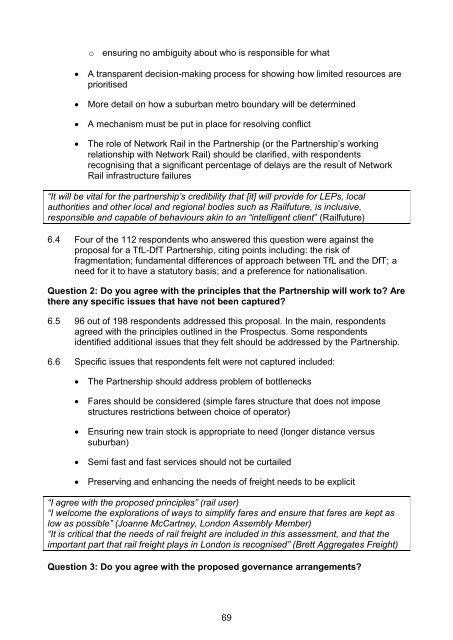Title Rail devolution business case narrative 1 Summary
rail-devolution-business-case-narrative
rail-devolution-business-case-narrative
Create successful ePaper yourself
Turn your PDF publications into a flip-book with our unique Google optimized e-Paper software.
o ensuring no ambiguity about who is responsible for what<br />
A transparent decision-making process for showing how limited resources are<br />
prioritised<br />
More detail on how a suburban metro boundary will be determined<br />
A mechanism must be put in place for resolving conflict<br />
The role of Network <strong>Rail</strong> in the Partnership (or the Partnership’s working<br />
relationship with Network <strong>Rail</strong>) should be clarified, with respondents<br />
recognising that a significant percentage of delays are the result of Network<br />
<strong>Rail</strong> infrastructure failures<br />
“It will be vital for the partnership’s credibility that [it] will provide for LEPs, local<br />
authorities and other local and regional bodies such as <strong>Rail</strong>future, is inclusive,<br />
responsible and capable of behaviours akin to an “intelligent client” (<strong>Rail</strong>future)<br />
6.4 Four of the 112 respondents who answered this question were against the<br />
proposal for a TfL-DfT Partnership, citing points including: the risk of<br />
fragmentation; fundamental differences of approach between TfL and the DfT; a<br />
need for it to have a statutory basis; and a preference for nationalisation.<br />
Question 2: Do you agree with the principles that the Partnership will work to? Are<br />
there any specific issues that have not been captured?<br />
6.5 96 out of 198 respondents addressed this proposal. In the main, respondents<br />
agreed with the principles outlined in the Prospectus. Some respondents<br />
identified additional issues that they felt should be addressed by the Partnership.<br />
6.6 Specific issues that respondents felt were not captured included:<br />
The Partnership should address problem of bottlenecks<br />
Fares should be considered (simple fares structure that does not impose<br />
structures restrictions between choice of operator)<br />
Ensuring new train stock is appropriate to need (longer distance versus<br />
suburban)<br />
Semi fast and fast services should not be curtailed<br />
Preserving and enhancing the needs of freight needs to be explicit<br />
“I agree with the proposed principles” (rail user)<br />
“I welcome the explorations of ways to simplify fares and ensure that fares are kept as<br />
low as possible” (Joanne McCartney, London Assembly Member)<br />
“It is critical that the needs of rail freight are included in this assessment, and that the<br />
important part that rail freight plays in London is recognised” (Brett Aggregates Freight)<br />
Question 3: Do you agree with the proposed governance arrangements?<br />
69


